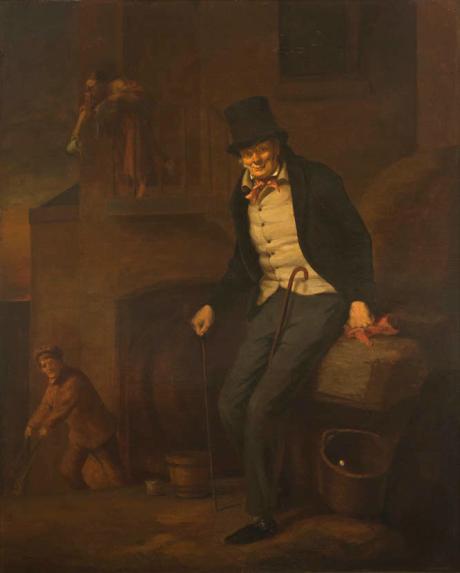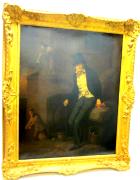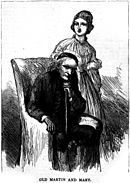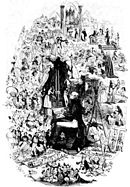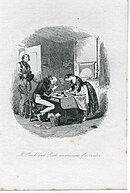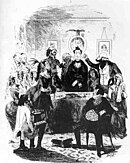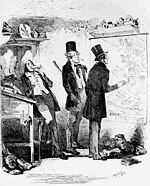The Life and Adventures of Martin Chuzzlewit (commonly known as Martin Chuzzlewit) is a novel by Charles Dickens, considered the last of his picaresque novels. It was originally serialised between 1842 and 1844. While writing it Dickens told a friend that he thought it his best work, but it was one of his least popular novels. Like nearly all of Dickens' novels, Martin Chuzzlewit was released to the public in monthly instalments. Early sales of the monthly parts were disappointing, compared to previous works, so Dickens changed the plot to send the title character to America. This allowed the author to portray the United States (which he had visited in 1842) satirically as a near wilderness with pockets of civilisation filled with deceptive and self-promoting hucksters.
The main theme of the novel, according to a preface by Dickens, is selfishness, portrayed in a satirical fashion using all the members of the Chuzzlewit family. The novel is also notable for two of Dickens' great villains, Seth Pecksniff and Jonas Chuzzlewit. It is dedicated to Angela Georgina Burdett-Coutts, a friend of Dickens.
Martin Chuzzlewit has been raised by his grandfather and namesake. Years before, Martin senior took the precaution of raising an orphaned girl, Mary Graham. She is to be his nursemaid, with the understanding that she will be well cared for only as long as Martin senior lives. She thus has strong motivation to promote his well-being, in contrast to his relatives, who only want to inherit his money. However, his grandson Martin falls in love with Mary and wishes to marry her, ruining Martin senior's plans. When Martin refuses to give up the engagement, his grandfather disinherits him.
Martin becomes an apprentice to Seth Pecksniff, a greedy architect. Instead of teaching his students, he lives off their tuition fees and has them do draughting work that he passes off as his own. He has two spoiled daughters, nicknamed Cherry and Merry, having been christened as Charity and Mercy. Unbeknown to Martin, Pecksniff has actually taken him on to establish closer ties with the wealthy grandfather, thinking that this will gain Pecksniff a prominent place in the will.
Young Martin befriends Tom Pinch, a kind-hearted soul whose late grandmother had given Pecksniff all she had, believing Pecksniff would make an architect and gentleman of him. Pinch is incapable of believing any of the bad things others tell him of Pecksniff, and always defends him vociferously. Pinch works for exploitatively low wages, while believing he is the unworthy recipient of Pecksniff's charity.
When Martin senior hears of his grandson's new life, he demands that Pecksniff kick young Martin out. Then, Martin senior moves in and falls under Pecksniff's control. During this time, Pinch falls in love with Mary, but does not declare it, knowing of her attachment to young Martin.
One of Martin senior's greedy relatives is his brother, Anthony Chuzzlewit, who is in business with his son, Jonas. Despite considerable wealth, they live miserly, cruel lives, with Jonas constantly berating his father, eager for the old man to die so he can inherit. Anthony dies abruptly and under suspicious circumstances, leaving his wealth to Jonas. Jonas then woos Cherry, whilst arguing constantly with Merry. He then abruptly declares to Pecksniff that he wants to marry Merry, and jilts Cherry - not without demanding an additional 1,000 pounds on top of the 4,000 that Pecksniff had promised him as Cherry's dowry, with the argument that Cherry has better chances for matchmaking.
Jonas, meanwhile, becomes entangled with the unscrupulous Montague Tigg and joins in his pyramid scheme-like insurance scam. At the beginning of the book he is a petty thief and hanger-on of a Chuzzlewit relative, Chevy Slyme. Tigg cheats young Martin out of a valuable pocket watch and uses the funds to transform himself into a seemingly fine man called "Tigg Montague". This façade convinces investors that he must be an important businessman from whom they may greatly profit. Jonas eventually ends up murdering Tigg, who has acquired some kind of information on him.
At this time, Tom Pinch finally sees his employer's true character. Pinch goes to London to seek employment, and rescues his governess sister Ruth, who he discovers has been mistreated by the family employing her. Pinch quickly receives an ideal job from a mysterious employer, with the help of an equally mysterious Mr. Fips.
Young Martin, meanwhile, has encountered Mark Tapley. Mark is always cheerful, which he decides does not reflect well on him because he is always in happy circumstances and it shows no strength of character to be happy when one has good fortune. He decides he must test his cheerfulness by seeing if he can maintain it in the worst circumstances possible. To this end, he accompanies young Martin when he goes to the United States to seek his fortune. The men attempt to start new lives in a swampy, disease-filled settlement named "Eden", but both nearly die of malaria. Mark finally finds himself in a situation in which it can be considered a virtue to remain in good spirits. The grim experience, and Mark's care nursing Martin back to health, change Martin's selfish and proud character, and the men return to England, where Martin returns penitently to his grandfather. But his grandfather is now under Pecksniff's control and rejects him.
At this point, Martin is reunited with Tom Pinch, who now discovers that his mysterious benefactor is old Martin Chuzzlewit. The older Martin had only been pretending to be in thrall to Pecksniff. Together, the group confront Pecksniff with their knowledge of his true character. They also discover that Jonas murdered Tigg to prevent him from revealing that he had planned to murder Anthony.
Senior Martin now reveals that he was angry at his grandson for becoming engaged to Mary because he had planned to arrange that particular match himself, and felt his glory had been thwarted by them deciding on the plan themselves. He realises the folly of that opinion, and Martin and his grandfather are reconciled. Martin and Mary are married, as are Ruth Pinch and John Westlock, another former student of Pecksniff's. Tom Pinch remains in unrequited love with Mary for the rest of his life, never marrying, and always being a warm companion to Mary and Martin and to Ruth and John.
The main characters of the story are the members of the extended Chuzzlewit family.
The first to be introduced is Seth Pecksniff, a widower with two daughters, who is a self-styled teacher of architecture. He believes that he is a highly moral individual who loves his fellow man, but mistreats his students and passes off their designs as his own for profit. He seems to be a cousin of Old Martin Chuzzlewit. Pecksniff's rise and fall follows the novel's plot arc.
Next we meet his two daughters, Charity and Mercy Pecksniff. They are also affectionately known as Cherry and Merry, or as the two Miss Pecksniffs. Charity is portrayed throughout the book as having none of that virtue after which she is named, while Mercy, the younger sister, is at first silly and girlish in a manner that's probably inconsistent with her numerical age. Later events in the story drastically change her personality.
Old Martin Chuzzlewit, the wealthy patriarch of the Chuzzlewit family, lives in constant suspicion of the financial designs of his extended family. At the beginning of the novel he has aligned himself with Mary, an orphan, to have a caretaker who is not eyeing his estate. Later in the story he makes an apparent alliance with Pecksniff, who, he believes, is at least consistent in character. His true character is revealed by the end of the story.
Young Martin Chuzzlewit is the grandson of Old Martin Chuzzlewit. He is the closest relative of Old Martin and has inherited much of the stubbornness and selfishness of the old man. Young Martin is the protagonist of the story. His engagement to Mary is the cause of estrangement between himself and his grandfather. By the end of the story he becomes a reformed character, realising and repenting of the selfishness of his previous actions.
Anthony Chuzzlewit is the brother of Old Martin. He and his son, Jonas, run a business together called Chuzzlewit and Son. They are both self-serving, hardened individuals who view the accumulation of money as the most important thing in life.
Jonas Chuzzlewit is the mean-spirited, sinisterly jovial son of Anthony Chuzzlewit. He views his father with contempt and wishes for his death so that he can have the business and the money for himself. It is suggested that he may have actually hastened the old man's death. He is a suitor of the two Miss Pecksniffs, wins one, then is driven to commit murder by his unscrupulous business associations.
Mr and Mrs Spottletoe are the nephew-in-law and niece of Old Martin Chuzzlewit, Mrs Spottletoe being the daughter of Old Martin's brother. She was also once the favourite of Old Martin though they have since fallen out.
George Chuzzlewit is the bachelor cousin of Old Martin.
Thomas (Tom) Pinch is a former student of Pecksniff's who has become his personal assistant. He is kind, simple, and honest in everything he does, serving as a foil to Pecksniff. He carries in his heart an undying loyalty and admiration for Pecksniff. Eventually, he discovers Pecksniff's true nature through his treatment of Mary, whom Pinch has come to love. Because Tom Pinch plays such a large role in the story, he is sometimes considered the novel's true protagonist.
Ruth Pinch is Tom Pinch's sister. She is sweet and good, like her brother. At first she works as a governess to a wealthy family with several nasty brats. Later in the novel she and Tom set up housekeeping together. She falls in love with, and marries, Tom's friend John Westlock.
Mark Tapley, the good-humoured employee of the Blue Dragon Inn and suitor of Mrs Lupin (the Dragon's owner), leaves that establishment to find work that's more of a credit to his character: that is, work sufficiently miserable that his cheerfulness will be more of a credit to him. He eventually joins Young Martin Chuzzlewit on his trip to America, where he finds at last a situation that requires the full extent of his innate cheerfulness of disposition. Martin buys a piece of land in a settlement called "Eden"—which, if not actually underwater, is at least in the midst of a malarial swamp. Mark nurses him through his illness, and they eventually return to England.
Montague Tigg / Tigg Montague is a down-on-his-luck rogue at the beginning of the story, and a hanger-on to distant Chuzzlewit kin Chevy Slyme. Later, he starts a thriving, sleazy insurance business with no money at all and lures Jonas into the business. (The Anglo-Bengalee Disinterested Loan and Life Assurance Company is in essence a classic Ponzi scheme—founded before Charles Ponzi was born—which paid off early policyholders' claims with premiums from more recent policyholders.)
John Westlock begins as a disgruntled student falling out with Pecksniff. After Tom Pinch's flight to London, John serves as a mentor and companion to both Tom and his sister; he falls in love with and eventually marries Ruth Pinch.
Mr Nadgett is a soft-spoken, mysterious individual who is Tom Pinch's landlord and serves as Montague's private investigator. He was the first fictional private investigator.[4] He was never given a first name by Dickens and was hired to investigate the private lives of potential clients whom Montague hoped to defraud with his insurance scam.
Sarah Gamp (also known as Sairey or Mrs Gamp). Sarah Gamp is an alcoholic who works as a midwife, monthly nurse, and layer-out of the dead. Even in a house of mourning, Mrs Gamp manages to enjoy all the hospitality a house can afford, with little regard for the person to whom she is there to minister; and she is often much the worse for drink. In her nursing activities, she constantly refers to a Mrs Harris, who is in fact "a phantom of Mrs Gamp's brain ... created for the express purpose of holding visionary dialogues with her on all manner of subjects, and invariably winding up with a compliment to the excellence of her nature." She habitually carries with her a battered black umbrella: so popular with the Victorian public was the character that Gamp became a slang word for an umbrella in general. The character was based upon a real nurse described to Dickens by his friend, Angela Burdett-Coutts.
Mary Graham is the caretaker of old Martin Chuzzlewit, who has told her she will receive nothing from him in his will. The older Martin expects that this will give Mary a strong interest in keeping him alive and well. Mary and old Martin Chuzzlewit's grandson fall in love, thus giving her an interest in the elder Chuzzlewit's death. The two lovers are separated by the events of the book, but are eventually reunited.
Mr Chuffey is Anthony Chuzzlewit's old clerk and lifelong companion.
Jefferson Brick is a war correspondent in The New York Rowdy Journal.
Mr Bailey is physically of small build and employed by the fraudster Montague Tigg and has been willing to sacrifice his Jewish beard to be a friend to a local barber, Paul (Poll) Sweedlepipe, let alone buys birds from him. There is such a frolic wonderfulness in his character and mien that even the unscrupulous rascal Montague deeply lamented for him when he was reported to suffer a fatal head injury after he was knocked out of the cabriolet, saying that he would rather lose a large sum of money than lose him. To the barber's relief and joy, he recovers from the injury in the end.
Martin Chuzzlewit was published in 19 monthly instalments, each comprising 32 pages of text and two illustrations by Hablot K. "Phiz" Browne and costing one shilling.[citation needed]The last part was double-length.
- I – December 1842 (chapters 1–3)
- II – February 1843 (chapters 4–5)
- III – March 1843 (chapters 6–8)
- IV – April 1843 (chapters 9–10)
- V – May 1843 (chapters 11–12)
- VI – June 1843 (chapters 13–15)
- VII – July 1843 (chapters 16–17)
- VIII – August 1843 (chapters 18–20)
- IX – September 1843 (chapters 21–23)
- X – October 1843 (chapters 24–26)
- XI – November 1843 (chapters 27–29)
- XII – December 1843 (chapters 30–32)
- XIII – January 1844 (chapters 33–35)
- XIV – February 1844 (chapters 36–38)
- XV – March 1844 (chapters 39–41)
- XVI – April 1844 (chapters 42–44)
- XVII – May 1844 (chapters 45–47)
- XVIII – June 1844 (chapters 48–50)
- XIX-XX – July 1844 (chapters 51–54)
The early monthly numbers were not as successful as Dickens' previous work and only sold about twenty thousand copies each (compared to forty to fifty thousand for the monthly numbers of the Pickwick Papers and Nicholas Nickleby and sixty to seventy thousand for the weekly issues of Barnaby Rudge and The Old Curiosity Shop) causing a break between Dickens and his publishers Chapman and Hall when they invoked a penalty clause in his contract requiring him to pay back money they had lent him to cover their costs. Also, Dickens' scathing satire of American modes and manners in the novel won him no friends on the other side of the Atlantic, where the instalments containing the offending chapters were greeted with a 'frenzy of wrath'. As a consequence, Dickens received much abusive mail and many newspaper clippings from the U.S.
Anti-Americanism
The novel was seen by some to contain attacks on America, although Dickens himself saw it as satire, similar in spirit to his "attacks" on the people and institutions of England in novels such as Oliver Twist. Fraud is shown as a common feature in America, although the insurance scheme practised in England in this novel is equally fraudulent. Americans are satirically portrayed; they proclaim their equality at every opportunity but, when they have travelled to England, they claim to have been received only by aristocrats.
The Republic is described as "so maimed and lame, so full of sores and ulcers, foul to the eye and almost hopeless to the sense, that her best friends turn from the loathsome creature with disgust". Dickens also attacks the institution of slavery in the United States in the following words: "Thus the stars wink upon the bloody stripes; and Liberty pulls down her cap upon her eyes, and owns oppression in its vilest aspect for her sister."
According to an account in the Boston Bee, the negative portrayal of America in Martin Chuzzlewit caused one Englishman to be so disgusted that he chose to drown himself so that he would not have to enter New York.
George L. Rives wrote "It is perhaps not too much to say that the publication of Martin Chuzzlewit did more than almost any other one thing to drive the United States and England in the direction of war" (over the Oregon boundary dispute, which was eventually resolved peacefully).
In 1844 the novel was adapted into a stage play at the Queen's Theatre and featured Thomas Manders as Sarah Gamp.
A silent short film adaptation of the novel was released in 1912. The novel was adapted into a television mini series of the same name in 1994, starring Paul Scofield and Pete Postlethwaite. Examples of references in other television productions include one in the 1956 film Our Miss Brooks (concluding the television and radio series of the same name). Miss Brooks is tutoring teenaged Gary Nolan and gives him the choice of reading and writing a book report on Martin Chuzzlewit, or simply writing an article for the school paper. In The Simpsons episode "Brother, Can You Spare Two Dimes?", Lisa Simpson lists it as one of the books that she would receive from the Greater Books of the Western Civilization. In the Doctor Who episode "The Unquiet Dead", The Doctor expresses his admiration for Dickens' works but criticises Martin Chuzzlewit, saying, "Mind you, for God's sake, the American bit in Martin Chuzzlewit, what's that about? Was that just padding? Or what? I mean, it's rubbish, that bit."
In cinema, the CGI movie Barbie in a Christmas Carol features a snooty cat named Chuzzlewit who is the pet of Barbie's character Eden Starling. John Travolta's character quotes from the novel in A Love Song for Bobby Long.
The novel features prominently in Jasper Fforde's novel The Eyre Affair.
Charles Dickens' works are especially associated with London which is the setting for many of his novels. These works do not just use London as a backdrop but are about the city and its character.
Dickens described London as a Magic lantern, a popular entertainment of the Victorian era, which projected images from slides. Of all Dickens' characters 'none played as important a role in his work as that of London itself', it fired his imagination and made him write. In a letter to John Forster, in 1846, Dickens wrote 'a day in London sets me up and starts me', but outside of the city, 'the toil and labour of writing, day after day, without that magic lantern is IMMENSE!!'. However, of the identifiable London locations that Dickens used in his work, scholar Clare Pettitt notes that many no longer exist, and, while 'you can track Dickens' London, and see where things were, but they aren't necessarily still there'. In addition to his later novels and short stories, Dickens' descriptions of London, published in various newspapers in the 1830s, were released as a collected edition Sketches by Boz in 1836. Charles Dickens' first son, also called Charles Dickens, wrote a popular guidebook to London called Dickens's Dictionary of London in 1879. Dickens' first novel The Posthumous Papers of the Pickwick Club (also known as The Pickwick Papers) follows the travels of the club's members around England, and, between them, they stay in over one hundred inns during their journeys. A selection of those in the London area, including the George and Vulture in Lombard Street and the Golden Cross at Charing Cross, were the subject of Bertram Waldrom Matz's 1921 book The inns & taverns of "Pickwick", with some observations on their other associations, and still feature on Pub crawl guides today.When Oliver joins the Artful Dodger to travel to Fagin's lair, they make their way through a series of streets until they reach the neighbourhood of Saffron Hill. While the novel's final scene is set on Jacob's Island, where the murderous Bill Sikes meets his death while trying to escape into part of the River Neckinger known as Folly's Ditch.Charles Dickens' father was incarcerated in the debtors' prison of Marshalsea in Southwark,[16] along with his wife and all their children except for Dickens and his sister Fanny, where much of Little Dorrit is set. Most of the prison has been demolished but a wall remains near the Southwark Local Studies Library in Borough High Street.The remaining wall also adjoins the churchyard of St George the Martyr where the fictional Amy (the Little Dorrit of the title) sleeps the night after arriving back late to the Marshalsea, and also where she marries Arthur Clennam. Also close by is theThe George Inn where Amy's brother Tip adds his request to a begging letter. Another inmate of the Marshalsea, Mr. Plornish, moves with his family to Bleeding Heart Yard, Farringdon, and receives a visit there from Arthur Clennam when he's making inquiries into the Dorrits

